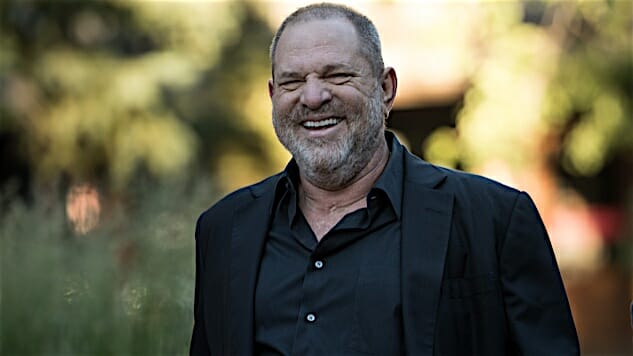How to Build an Indie Empire … and a List of Sexual Assault Accusations
Photo Courtesy Drew Angerer/Getty Images
As more and more survivors of assault and coercion step forward to attack the culture that silences women, it becomes clear we’re going to need to think about how we remember some foundational works of film and the men who made them. This article is the first in a series where we examine the cultural impact of entertainment industry titans and then grapple with the allegations that have had them expelled from public life.
Every man, me included, who says he’s never mistreated a woman, is either lying or in denial. There are those of us who feel bad about it—who want to go back in time and slap the shit out of our past selves—and then there are your Harvey Weinsteins.
Harvey and his brother Bob were concert promoters when they decided to take a risk and create a film production company in 1979. They named it Miramax, combining the first names of their parents, Miriam and Max. Remember this as we discuss how inextricably linked are the rise of their studios, the visibility and prestige of the art they eventually produced, and the accompanying egos of the brothers themselves, and what it allowed them to get away with.
Now, both brothers stand accused not just of sexual assault and harassment, but, in Harvey’s case, of going to absurd, supervillain-like lengths to cover up his filthy behavior, including harassment campaigns, a small army of lawyers serving up settlements that essentially let them continue their evil consequence-free, and ex-Mossad private investigators. (Links to reports detailing these allegations are included at the end.) For many, having to associate pop culture gems of the latter 20th Century like Clerks or Pulp Fiction with the unspeakable things now coming to light is a deeply painful and disconcerting experience. And then there’s me, who disliked those stupid fucking movies with their too-clever-by-half quotes just enough that I feel like I have a less sentimental view of the situation.
For me, the ’90s pop culture dominance of the films Miramax acquired and distributed marked a deeply irritating trend of smart-assery and sarcasm that was too good for you to understand. There were the “cool” kids, and then there were the kids who wouldn’t shut the hell up about Clerks. There were the “popular” kids, and then there were the kids who got hopped up on Pixie Sticks and joined the A/V club just so they could produce their weird stream-of-consciousness homages to Reservoir Dogs (distributed by Miramax in 1992).
-

-

-

-

-

-

-

-

-

-

-

-

-

-

-

-

-

-

-

-

-

-

-

-

-

-

-

-

-

-

-

-

-

-

-

-

-

-

-

-








































